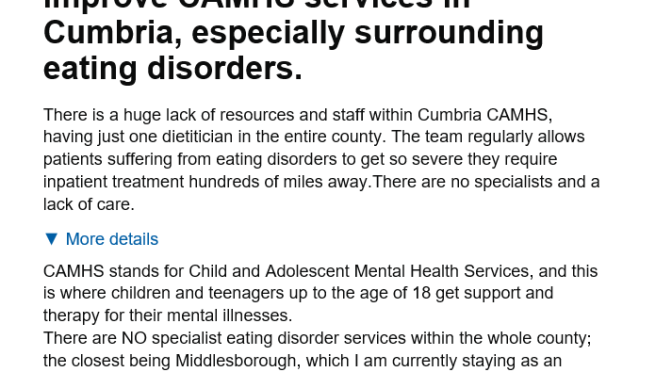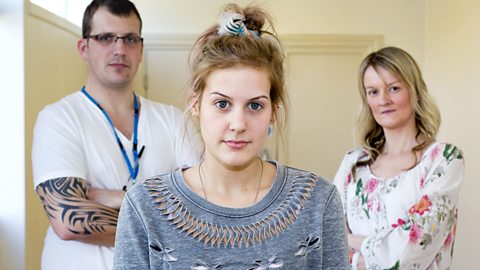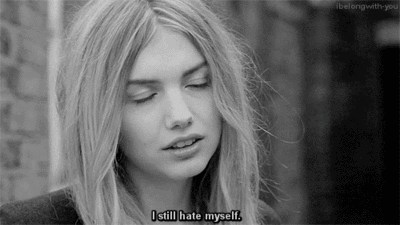Hello!
I’ve kept this petition on the down low until I knew that it was fully up and running and agreed by the authorities that allow these kinds of things to be published. Until NOW.
(As a little foreword, I had to email this petition to 5 people and have them support it to first get it up and running and I finally have those 5 supporters now. This now means it will be checked and verified and then published officially, giving me 6 months to collect 10,000 signatures in order for it to be reviewed by the government/parliament.)
https://petition.parliament.uk/petitions/162797
I have wanted to make this petition for so long but have always too anxious to; convincing myself that I was an attention seeker BUT even if that was true, which as much as I may try to convince myself, it really is not, this action will help so so many other sufferer’s lives in our county in the years to come.
This is something I feel very passionate about as it is something very close to my heart and has been a part of my life for around 5 years now. I am learning not to be ashamed of the fact that: I have Anorexia Nervosa. I have had for 5 years of my 17 year-long life now already. I also have multiple other mental illnesses that have made my life immensely difficult in the past and still do despite being in active recovery.
I am soon to be discharged from my second stay in a specialist eating disorder inpatient unit. I have spent a total of a year of my life (or more) in this very unit.
It is 120 miles away from my home.
That is a minimum of a 2 and half hour -journey ONE WAY.
This is the closest one to me as there is zero specialist eating disorder treatment within the entire county, with an area of 4206 miles squared.
I want to make it clear that this is not a vendetta against a particular individual. Nor am I saying that this is the services’ fault; this really is through lack of funding and trained individuals working within the service in this county. It is not even a direct action for myself and my own care as I will soon be transitioning into adult services which begin at the age of 18. But this has gone on long enough. It has effected far too many people already and it will only continue to happen in the future if direct action like this isn’t taken.
In my own experience of the CAMHS services, that despite being incredibly grateful for a lot of the direct support that I have received in understanding myself and my illnesses, there is still a long way to go and a lot of failings, not caused by any one individual, but rather a general lack of resources and funding. Mental illnesses are allowed to get out of hand before proper intervention is taken. Personally, I was allowed to destroy myself and my body, despite constantly telling the services and originally actively seeking support, not just once but twice. I was allowed to deteriorate to below my dangerously underweight lowest before I was finally referred to inpatient services. This was at least a wait of 6 months, if not much, much longer. Many sufferers are not able to actively seek support this way and intervention must be taken so much sooner to stop this from happening, especially surrounding eating disorders.
In my own experience, every single person that I have met in my inpatient centre in Middlesborough, has been struggling so drastically that they were not physically able to or allowed to walk. They were in a wheelchair, even to get to their bedroom down the short corridor. Why must we as sufferers from such a horribly common mental illness, have to physically deteriorate ourselves at all to be taken seriously, never mind to such a dangerous degree?
This has to change.
We recently received a letter telling of a grant of money being given to Cumbria to increase eating disorder services which I am immensely grateful for. I can only hope that this goes ahead and services do improve. I guess I’m just a desperate and scared teenage girl trying to make even the slightest difference.
Soooooo:
Here is the link to my petition below and I can only ask you to take a couple of minutes out of your day to make such an incredible difference.
https://petition.parliament.uk/petitions/162797




